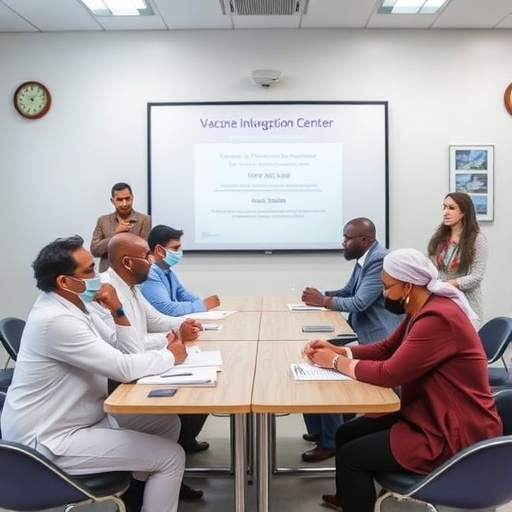The Korea University College of Medicine’s Vaccine Innovation Center recently played host to a distinguished delegation of Ethiopian health officials, signaling a significant stride in international collaboration for vaccine research and development. This invited training session, conducted on the first day of September, forms a vital component of a larger initiative titled ‘2025 Vaccine Development and Production Education for Strengthening Ethiopia’s Vaccine Ecosystem.’ Spearheaded by the International Vaccine Institute (IVI), this program embodies a forward-thinking approach to global health, aiming at empowering countries with the tools and knowledge to combat infectious diseases effectively.
At its core, the collaboration seeks to bolster Ethiopia’s capacity to innovate and produce vaccines, thereby enhancing the country’s resilience against current and future pandemics. Participants were given an immersive introduction to cutting-edge vaccine technology through a meticulously structured program that encompassed an overview of the Vaccine Innovation Center’s operations, robust question-and-answer sessions, and an intensive tour of Korea’s premier research facilities, including access to the Biosafety Level 3 (BL-3) laboratory. This exposure is crucial for Ethiopian health officials aiming to internalize both the theoretical frameworks and practical expertise necessary for contemporary vaccine science.
The Vaccine Innovation Center at Korea University College of Medicine embodies the pinnacle of private-sector vaccine research within South Korea. Having recently relocated to the state-of-the-art Mediscience Park Chung Mong-Koo Future Medicine Building in Jeongneung, the center benefits from sophisticated laboratory equipment and infrastructure conducive to high-containment research. The BL-3 laboratory, in particular, enables scientists to safely study highly infectious pathogens, a capability that is vital for advancing the development of vaccines against virulent diseases. This facility underpins the center’s commitment to high biosafety standards, ensuring research is conducted without risk to personnel or the broader community.
The training program’s design reflects an understanding of the multifaceted challenges faced by emerging economies like Ethiopia in global health. By providing direct access to premier facilities and expertise, the program bridges the technological and educational gap that often hinders local vaccine ecosystem development. Educational sessions elucidated the complexities of antigen design, adjuvant formulation, and the intricacies of clinical trial implementation—all fundamental pillars for successful vaccine development. The hands-on laboratory tour allowed Ethiopian professionals to witness the rigorous workflows and safety measures integrated into vaccine research, fostering an appreciation for precision and biosecurity.
Prof. Jeong Hee-jin, head of the Vaccine Innovation Center, articulated the center’s dedication to fostering international cooperation and knowledge exchange. The center’s philosophy revolves around not only pioneering domestic vaccine research but also acting as an incubator that elevates global health capacities through education and partnership. This vision aligns with the broader objectives of the International Vaccine Institute, whose mission encompasses accelerating vaccine access for underserved populations through technology transfer and capacity building.
The significance of this knowledge exchange extends beyond mere training; it represents a strategic investment in establishing a sustainable vaccine development infrastructure within Ethiopia. By integrating advanced research methodologies and safety protocols from Korea’s experience, Ethiopian health officials can adapt these frameworks to local contexts. Such capability building is essential for regional autonomy in vaccine production, reducing dependency on international supply chains, and accelerating response times during outbreaks.
Moreover, the session addressed emerging challenges in vaccine innovation, including the adaptation of mRNA platforms and vector-based technologies that have reshaped the landscape of immunization. Discussants examined how these novel modalities require sophisticated cold-chain logistics, stringent manufacturing controls, and regulatory expertise, aspects critical to the successful deployment of modern vaccines. The knowledge imparted through this training is anticipated to bolster Ethiopia’s regulatory and production capabilities, bridging the gap between research and practical application.
The comprehensive exposure also included bioinformatics and computational modeling techniques that drive antigen discovery and vaccine candidate optimization. Participants explored the role of genomic surveillance in identifying pathogen mutations and adjusting vaccine formulations accordingly. This forwards-looking approach prepares the Ethiopian vaccine workforce to remain agile in the face of evolving viral threats, a key consideration for long-term public health security.
Integral to the program was an emphasis on fostering a collaborative network between Korean and Ethiopian scientific communities. By facilitating ongoing dialogue and joint research initiatives, the Vaccine Innovation Center hopes to catalyze innovation ecosystems that transcend national borders. This ethos of partnership underscores the global nature of infectious disease control and the necessity for reciprocal knowledge exchange to achieve equitable health outcomes.
The implications of this training ripple through public health policy, as empowered Ethiopian health officials will both inform national strategies and potentially influence continental vaccine frameworks. Strengthened local expertise provides a foundation for Ethiopia to align with the goals of the African Vaccine Manufacturing Initiative, which advocates for continental self-sufficiency in vaccine production. Such advancements are pivotal for rapid pandemic response capabilities and minimizing the socioeconomic impacts of widespread disease.
In summation, the Korea University College of Medicine Vaccine Innovation Center’s initiative exemplifies the transformative potential of educational diplomacy in fostering global vaccine ecosystems. By combining technological excellence, rigorous safety standards, and an inclusive approach to capacity building, this collaboration charts a path toward a more resilient and equitable future in infectious disease control. With infectious diseases respecting no borders, the shared commitment between Korea and Ethiopia sets a precedent for how scientific innovation and international cooperation can collectively safeguard global health.
Image Credits: KU Medicine
Keywords: Educational programs, Scientific collaboration, Scientific associations




